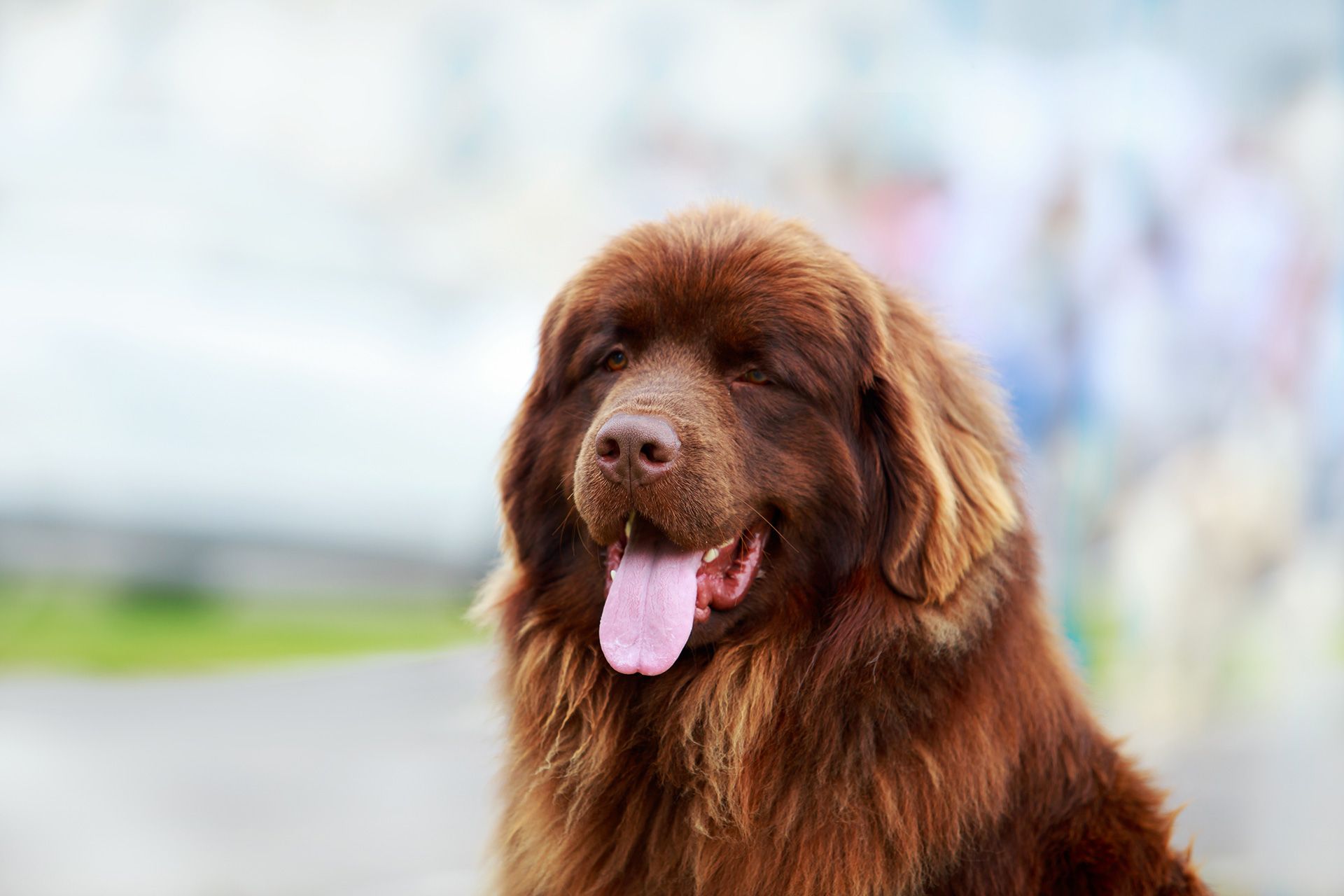With their massive size and gentle demeanor, Newfoundland dogs have earned a well-deserved reputation as one of the friendliest breeds of canines. Their affectionate nature and loyal disposition make them beloved companions for families, singles, and even other pets. In this article, we will explore the heartwarming qualities of Newfoundland dogs and why they are renowned for their amiable nature.
Whether you're considering adding one to your family or simply curious about this remarkable breed, understanding their friendliness is key to appreciating these magnificent creatures. Get ready to uncover the delightful traits that make Newfoundland dogs treasured companions as we explore the true essence of their friendliness.

Temperament and Personality of Newfoundland Dogs
Newfoundland dogs are known for their sweet and gentle personalities. They are often referred to as "gentle giants" due to their large size and calm demeanor. Despite their imposing appearance, these dogs are incredibly friendly and affectionate, especially towards children. Their patience and protective nature make them excellent family pets. Newfoundland dogs are also known for their intelligence and willingness to please, which makes them relatively easy to train. Their loyalty and devotion to their human companions are unparalleled, making them wonderful additions to any household.
Newfoundland dogs are also renowned for their rescue instincts. They have a natural affinity for water and are excellent swimmers, making them well-suited for water rescue missions. This innate instinct to help and protect extends to their interactions with people, as they are known to be incredibly attentive and empathetic. Their gentle and nurturing nature makes them excellent therapy dogs, providing comfort and support to those in need. Overall, the temperament and personality of Newfoundland dogs make them exceptionally friendly and compassionate companions.
Newfoundland dogs, like all breeds, require proper socialization and training to ensure they develop into well-mannered and friendly companions. Early socialization is crucial to help them become accustomed to various people, animals, and environments. Introducing them to different experiences and settings from a young age can help prevent shyness or fearfulness as they mature. Additionally, consistent and positive training methods are essential to harness their intelligence and eagerness to please. Patience, encouragement, and rewards are key elements in training Newfoundland dogs, as they respond well to positive reinforcement. With proper socialization and training, Newfoundland dogs can showcase their friendly and amiable nature, making them a joy to be around.
Living with a Newfoundland Dog
Living with a Newfoundland dog can be a rewarding experience, especially for those who appreciate their gentle and friendly nature. Due to their size, they require ample space to move around comfortably. A spacious living environment, whether it's a house with a yard or a larger apartment, is ideal for accommodating their size and energy levels. It's important to provide them with a designated space for relaxation, as Newfoundland dogs appreciate having their own area to unwind.

Despite their large stature, Newfoundland dogs are known for their laid-back and calm demeanor indoors. They are content to lounge around the house and are often referred to as "couch potatoes." However, regular exercise is essential to keep them healthy and prevent weight gain. Daily walks, playtime, and even swimming sessions are beneficial for their physical and mental well-being. Engaging in activities with them not only strengthens the bond between the owner and the dog but also allows Newfoundland dogs to showcase their friendly and playful disposition.
In a household with children, Newfoundland dogs are known to be incredibly tolerant and protective. Their patient and nurturing nature makes them well-suited for families with young children. However, it's crucial to teach children how to interact respectfully with the dog and to supervise their interactions to ensure a harmonious relationship. Newfoundland dogs thrive on companionship and are happiest when they are included in family activities. With the right living environment and proper care, living with a Newfoundland dog can be a delightful experience filled with warmth and affection.
Health and Grooming of Newfoundland Dogs
Maintaining the health and grooming of Newfoundland dogs is essential to ensure their well-being and overall friendliness. Their thick double coat requires regular grooming to prevent matting and tangles. Brushing their coat several times a week helps to remove loose fur and keeps their coat in good condition. Additionally, regular baths and nail trims are necessary to keep them clean and comfortable.
Newfoundland dogs are prone to certain health issues, including hip dysplasia, heart conditions, and joint problems due to their size. Regular veterinary check-ups and a balanced diet are crucial in maintaining their health. Providing them with a nutritious diet and ample exercise can help prevent obesity and promote their overall well-being. Additionally, being mindful of their environment and avoiding extreme temperatures is important to ensure their comfort and health.
Maintaining their health not only contributes to their physical well-being but also impacts their overall demeanor and friendliness. A healthy and well-cared-for Newfoundland dog is more likely to exhibit a friendly and affectionate disposition, making it essential to prioritize their health and grooming needs.
Exercise and Activity for Newfoundland Dogs
Despite their laid-back nature indoors, Newfoundland dogs require regular exercise and activity to keep them healthy and happy. Daily walks, playtime, and swimming sessions are essential to prevent them from becoming sedentary and to maintain their physical fitness. Their love for water makes swimming an enjoyable and beneficial activity for them, providing both exercise and mental stimulation.
Engaging in activities that stimulate their intelligence, such as obedience training, agility exercises, and interactive games, can also contribute to their overall well-being. Newfoundland dogs thrive on mental stimulation and enjoy learning new skills and tasks. Providing them with opportunities to engage in various activities not only keeps them physically fit but also allows them to showcase their friendly and playful nature.
Incorporating regular exercise and activity into their routine not only contributes to their physical health but also enhances their friendly disposition. Newfoundland dogs are known for their affectionate and sociable nature, and regular exercise helps them release excess energy and maintain a balanced temperament. By prioritizing their exercise and activity needs, owners can help Newfoundland dogs showcase their friendly and amiable qualities to the fullest.
Interacting with Other Pets and People
Newfoundland dogs are known for their friendly and amiable nature, making them excellent companions for other pets and people. Their gentle demeanor and nurturing instincts make them well-suited for households with multiple pets. With proper introductions and supervision, Newfoundland dogs can coexist harmoniously with other animals, displaying their friendly and tolerant nature.

When it comes to interacting with people, Newfoundland dogs are known for their affectionate and loyal disposition. They are often described as "nanny dogs" due to their protective and nurturing behavior towards children. Their patient and gentle nature makes them ideal companions for families, as they are known to be incredibly tolerant and affectionate towards all family members. Additionally, they are known to form strong bonds with their human companions, providing unwavering loyalty and companionship.
Proper socialization from an early age is key to ensuring that Newfoundland dogs are well-adjusted and friendly towards both people and other pets. Exposing them to various experiences and interactions can help them develop into well-mannered and sociable companions. With the right guidance and positive reinforcement, Newfoundland dogs can showcase their friendly and amiable nature in their interactions with other pets and people.
Tips for Owning a Newfoundland Dog
Owning a Newfoundland dog comes with its own set of considerations and responsibilities. Here are some essential tips for providing the best care for these gentle giants:
1. Regular grooming: Maintain their double coat through regular brushing, baths, and nail trims.
2. Balanced diet: Provide them with a nutritious diet to support their overall health and well-being.
3. Exercise: Engage in regular exercise and activity to keep them physically and mentally stimulated.
4. Socialization: Expose them to various experiences and interactions from a young age to ensure they become well-mannered and friendly companions.
5. Veterinary care: Schedule regular check-ups and vaccinations to maintain their health and address any potential issues promptly.
6. Supervision: Always supervise interactions with children and other pets to ensure a harmonious environment for all.
7. Love and companionship: Offer them love, attention, and companionship to nurture their friendly and affectionate nature.
By following these tips, owners can provide a nurturing and supportive environment for Newfoundland dogs, allowing them to showcase their friendly and amiable qualities to the fullest.

Finding a Reputable Breeder or Rescue Organization
When considering adding a Newfoundland dog to your family, it's essential to find a reputable breeder or rescue organization. A reputable breeder will prioritize the health and well-being of their dogs, conducting thorough health screenings and providing proper care for their puppies. They will also be knowledgeable about the breed and be able to offer guidance and support to potential owners.
Rescue organizations are also a valuable option for those looking to provide a loving home for a Newfoundland dog in need. By adopting from a rescue organization, individuals can offer a second chance to a dog in need while experiencing the joy of providing a forever home for a deserving animal.
Regardless of the source, it's important to conduct thorough research and ask relevant questions to ensure that the Newfoundland dog you welcome into your home comes from a reputable and caring background. By choosing a reputable breeder or rescue organization, potential owners can set the foundation for a fulfilling and harmonious relationship with their Newfoundland companion.
Conclusion
In conclusion, Newfoundland dogs are indeed friendly and amiable companions with a heartwarming disposition. Their gentle and nurturing nature, combined with their loyalty and intelligence, make them beloved additions to households seeking a friendly and affectionate canine companion. Understanding their temperament, socialization, living needs, health, exercise, interactions, and essential tips for ownership is crucial in providing the best care for these gentle giants.
Whether you're considering adding a Newfoundland dog to your family or simply admiring their remarkable qualities, their friendliness shines through in every aspect of their being. From their interactions with children and other pets to their willingness to please and provide comfort, Newfoundland dogs epitomize the genuine and heartfelt nature of a friendly companion.
Embracing the unique qualities of Newfoundland dogs allows for a deep appreciation of the warmth and affection they bring to the lives of those fortunate enough to share their journey. With their friendly and amiable nature, Newfoundland dogs continue to capture the hearts of many, leaving a lasting impression as gentle giants with an abundance of love to share.




